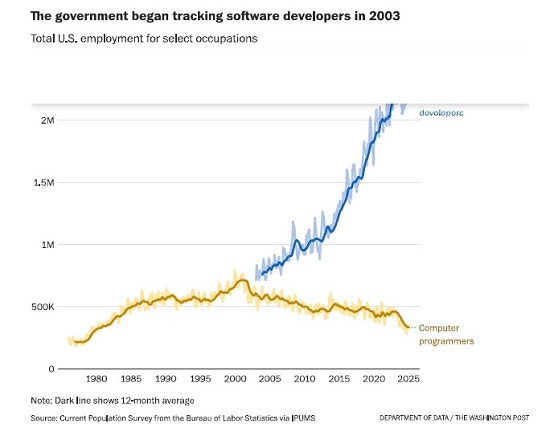Programmers Are Either Disappearing, or Being Called Something Else
Evidence coming in that ChatGPT is displacing certain levels of programmers while numbers of developers using AI coding tools is trending up; at Google, coding with AI tools now mainstream
By John P. Desmond, Editor, AI in Business

In the past two years, more than a quarter of what used to be called programming jobs have disappeared, leading to questions about what is going on.
The downturn was “sufficiently abysmal” to put computer programming among the 10 hardest-hit occupations with data compiled by the US Bureau of Labor Statistics, according to a recent account in The Washington Post.
The job titles of programmers and software developers are often used interchangeably, The number of software developers has been increasing steadily, reaching over 2 million this year, the data shows. The government defines the two jobs differently.
Programmers work from specifications drawn up by developers or business analysts, while developers work on what clients need and try to find solutions, working with programmers and perhaps hardware engineers. Pay scales reflect the difference, with the median programmer earning $99,700 in 2023, and the median developer, $132,270, the Post reported.
The biggest change in the environment in the past two years has been the introduction of ChatGPT in November 2022. “Could this be the first concrete evidence of generative AI replacing workers in the real world?” queried Post writer Andrew Van Dam. “We’ve seen endless warnings that AI would take our jobs, but until now there’s been precious little evidence that the taking had begun.”
Jobs may be shifting inside organizations to occupations that AI can complement rather than replace, suggested Northwestern University economist Dimitris Papanikolaou. Researchers at Anthropic, offering the Claude LLM alternative to ChatGPT, analyzed about a million conversations to match chatbot queries to specific activities tracked by the Labor Department for more than 700 occupations. “They found people used AI to perform the tasks usually assigned to computer programmers more than those of any other job,” Van Dam stated. “Software developers came next, ahead of almost every other profession.”
“Usage tilts more towards augmentation — which is things like having the AI check your work, asking questions to teach you things, iterating on a piece of work — rather than automation,” stated Alex Tamkin, research scientist at Anthropic to the Post. “And that suggests that right now AI is, on balance, used more as a tool to help you with the work you’re doing rather than automating small chunks of it.”
AI Accelerating Use of Coding Assistants
This new conventional wisdom that AI is accelerating the trend of automated coding assistants, or agents, used by software developers. Tools to automate coding tasks have been in use for decades; AI is making them better.
John Giorgi can attest to it. The 29-year–old computer scientist quoted in a recent account in The New York Times develops software for a healthcare startup that records and summarizes patient visits for doctors, freeing them from typing clinical notes. He estimates his AI coding agent saves him at least an hour a day. “I can’t imagine working without it now,” he stated.
Some two-thirds of software developers are using AI coding tools, according to a survey by the Evans Data research firm cited in the Times account.
IBM and Salesforce are among the big tech companies who have jumped into offering AI-assisted coding tools. Microsoft, which released its GitHub Copilot agent in 2021, is said to be the early commercial leader. Microsoft understands from its history the importance of capturing developers to capturing market share.
Thomas Dohmke, the chief executive of GitHub, has said before long, AI could write 80 to 90 percent of the code created by corporate developers. GitHub was acquired by Microsoft in October 2018 for $7.5 billion.
The consulting firm KPMG reported that developers using GitHub Copilot are saving 4.5 hours per week on average and the quality of their code has improved, based on a survey by the firm.
Per Scholas, a national nonprofit that prepares lower-income workers for careers in technology, overhauled its curriculum last year to adapt to the AI coding era. An AI fundamentals course helps software engineering students learn the basics of programming, then get hands-on experience using an AI assistant to write software programs.
“We’re encouraging them to really embrace it, understand its importance, because AI is pretty much necessary to be relevant in the workforce of the future,” stated Bolaji Saibu, a Per Scholas vice president who oversees course design.
AI Mainstreamed Into Development at Google
At Google, AI tools have been mainstreamed into software development. “More than a quarter of all new code at Google is generated by AI, then reviewed and accepted by engineers,” stated CEO Sundar Pichai said on the company’s third quarter 2024 earnings call, according to an account in The Verge.
The fusion of AI into Google’s product set is encompassing. Custom AI chatbots are powered by Gemini (called ‘Gems’); automatic note-taking assistance with aid from AI has surfaced in Google Meet; many generative AI tools have been fielded to help YouTube creators; and Google’s Pixel 9 lineup of smartphones has been stuffed with many AI tools.
CEO Pichai in a release stated, “In Search, our new AI features are expanding what people can search for and how they search for it. In Cloud, our AI solutions are helping drive deeper product adoption with existing customers, attract new customers and win larger deals. And YouTube’s total ads and subscription revenues surpassed $50 billion over the past four quarters for the first time.”
A case brought by the US Department of Justice last August during the Biden Administration, that Google is a monopolist in the search and advertising markets, with a breakup on the table as a remedy. The Trump Administration in March doubled down on this suit, following the Biden Administration’s lead on it, according to an account in The New York Times .
“Google’s illegal conduct has created an economic Goliath, one that wreaks havoc over the marketplace to ensure that — no matter what occurs — Google always wins,” the government stated in its filing on March 7. “The American people thus are forced to accept the unbridled demands and shifting, ideological preferences of an economic leviathan in return for a search engine the public may enjoy.”
How the Trump Administration lands on overall tech regulation is being closely watched. As in most areas at present, the landscape appears to be shifting. Tech execs have been courting favor with the president by traveling to Mar-a-Lago and donating millions of dollars. Chief executives including Tim Cook of Apple, Sundar Pichai of Google and Mark Zuckerberg of Meta sat behind Mr. Trump during his inauguration.
Judge Amit P. Mehta of the US District Court for the District of Columbia, scheduled hearings on the case for April, to hear arguments for proposed solutions. Google is pushing for an approach that would spur more competition, such as in the browser market.
See the source articles and information in The Washington Post, The New York Times, from a survey by Evans Data, from Per Scholas, a nonprofit tech training organization, from The Verge and in another account from The New York Times .




